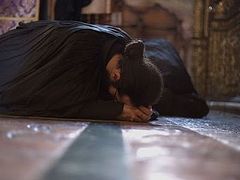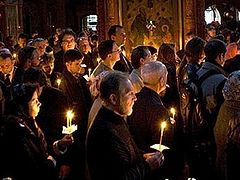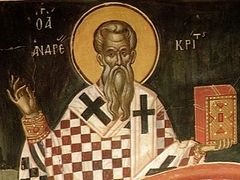Every year during Lent we invite into our churches a great pastor, St. Andrew of Crete, and listen while he leads us in a meditation on sin and repentance. That is, we listen while his Great Canon is chanted, and in response we reply over and over again, “Have mercy on me, O God, have mercy on me!” Some things in this long poetic work might strike some moderns as a bit jarring, if not downright pathological—all this self-flagellation over our sins, this torrent of anguish and self-abhorrence. Is all this really necessary? Is it even healthy?
A quick and superficial perusal of the text might leave us wondering. “There has never been a sin or act or vice in life that I have not committed, O Saviour. I have sinned in mind, word, and choice, in purpose, will and action, as no one else has ever done.” “I have sinned, O Lord, I have sinned against You. Be merciful to me. For there is no one who has sinned among men whom I have not surpassed by my sins.” “From my youth, O Christ I have rejected Your commandments. I have passed my whole life without caring or thinking, a slave of my passions. Therefore, O Saviour, I cry to You: at least in the end save me!” Isn’t all this self-condemnation a bit much? And how accurate is it? Are all those people standing about in church for hours on end in Lent really as bad as all that?
Such questions miss the point of the Great Canon. The long meditation from the pen of St. Andrew is not offered as an individual’s personal confession of sin. It is not intended to be the sort of thing one shares with a psychiatrist while lying on his couch, or with one’s confessor while standing before the Cross. It is not intended as autobiography, but as medicine. Like some medicines, it might seem a little severe, and even taste bitter. But it is exactly the medicine that we need, however it might taste.
The disease the medicine is intended to cure is the one now afflicting large segments of our modern secular population—that of careless and serene self-righteousness. We far too easily fall into the assumption that we are pretty sensational spiritually, and that we have racked up an impressive score. We soon enough become blind to our true spiritual state. We can see others’ sins clearly enough, especially when they sin against us, but our own failings often seem to elude us.
I remember this kind of delusional approach being expressed on the radio one afternoon. A lady was being interviewed about her life and her life choices, and she said that she really couldn’t bring herself to regret anything she had ever done, because all her actions combined to make her the person she was today. Quite the confession! Really—she couldn’t bring herself to regret anything? Ever in all her life? Speaking personally, I can find plenty of things I regret doing, saying, and thinking in the last twenty-four hours, never mind all my life. The interviewed lady seems to reflect a culture in the last stages of the “I’m Okay; You’re Okay” disease. We are just fine spiritually, and we can’t bring ourselves to regret anything we have done.
Into this den of insanity and illness comes St. Andrew of Crete, bearing just the right medicine. We need to hear him, to listen to our conscience afresh, and to submissively receive its inner rebuke. Something inside of us is indeed broken and dark, diseased and dying. By confessing the brokenness, by admitting to the darkness, we can begin to separate ourselves from them, and to find healing and soundness of mind and peace. The World with its lies shouts at us every day, all day long, without ceasing. We need a rival voice, the voice of sanity, a voice calling us home. We need St. Andrew and his Great Canon. Maybe that is why he is so welcome in our churches every Lent.





